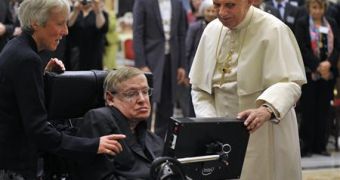An ongoing five-day scientific gathering on themes of evolution housed by the Vatican provided a clash of titans during the close encounter of the 3rd kind which is always the result of religion and science sharing the same space. During the meeting organized by the Pontifical Academy of Sciences, Pope Benedict XVI greeted Stephen Hawking, the British Lucasian Professor of Mathematics at Cambridge University and observed the technology that allows the scientist to speak and move artificially (he suffers from Lou Gehrig disease and a speaking ability impairment).
The pontiff provided more solid grounds to the recent approach of the church related to empirical science, stating that science should be perceived as the pursuit of knowledge related to God's creation. “There is no opposition between faith's understanding of creation and the evidence of the empirical sciences. Galileo saw nature as a book whose author is God,” he shared.
In 1633, Galileo Galilei, who discovered that Earth was spinning around the Sun and not the other way around, was accused of heresy and was rehabilitated only in 1992. In a similar manner, the Church of England apologized to Charles Darwin, the founder of the theory of evolution, for misunderstanding him at the time, in the 19th century. Now the Catholic church insists on a “theistic evolution”, which includes the scientific evolution into its doctrine of God's creating the human species.
Stephen Hawking, a guest at the conference called “Scientific Insights into the Evolution of the Universe and of Life” will share his own opinion on the universe's origins. Referring to his relation to God, Hawking shares that he is “not religious in the normal sense”. Instead, “I believe the universe is governed by the laws of science. The laws may have been decreed by God, but God does not intervene to break the laws,” explains the scientist.

 14 DAY TRIAL //
14 DAY TRIAL //